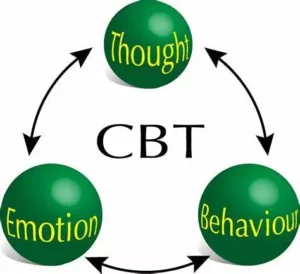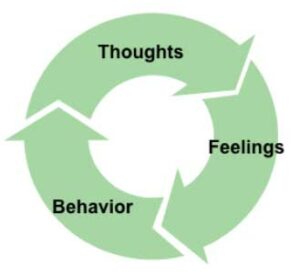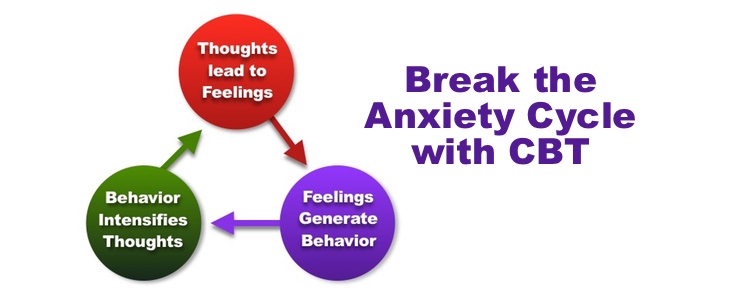Anxiety disorders are the most common mental health problems in the United States. They affect about 18 percent of adults or about 40 million people. Anxiety disorders can range from mild to severe, and they can make it difficult for people to lead normal lives. Cognitive-behavioral therapy is one type of treatment that has been shown to be effective in treating anxiety disorders. In this blog post, we will discuss what cognitive-behavioral therapy is and how it can help treat anxiety.
Contents
What Is CBT?
 CBT refers to a type of psychological therapy that helps people change the way they think and behave in order to feel better. It is based on the idea that our thoughts, feelings, and actions are all connected, and that negative patterns of thinking and behaving can make problems worse.
CBT refers to a type of psychological therapy that helps people change the way they think and behave in order to feel better. It is based on the idea that our thoughts, feelings, and actions are all connected, and that negative patterns of thinking and behaving can make problems worse.
CBT is cognitive-behavioral therapy that is a type of psychological therapy. It is an effective treatment for anxiety because it helps people to identify and challenge negative thoughts and beliefs, as well as develop healthy coping mechanisms.
One of the main goals of CBT is to help people learn how to manage and cope with their anxiety in a more positive way. In fact, studies have found that people who receive CBT for anxiety have less fear and avoidance of anxiety-provoking situations, and are more likely to maintain their gains in the long term.
If you or someone you know is struggling with anxiety, consider seeking out a therapist who specializes in CBT. It could be the key to helping you or your loved one live a happier, healthier life.
How Does CBT For Anxiety Work?
There is always a procedure of some kind when it comes to therapy. CBT is no different. When you first meet with your therapist, they will want to get to know you and your story. They will ask a lot of questions in order to get an understanding of your thoughts, feelings, and behaviors.
After that, they will work with you to identify any distorted thinking patterns that may be causing or exacerbating your anxiety. Once these patterns are identified, you and your therapist will work together to challenge and reframe them. This process can be difficult, but it is so important in order to help you manage your anxiety in a more healthy way.
CBT for anxiety typically lasts around 12-16 weeks, but this can vary depending on the individual and their needs. You will likely meet with your therapist once a week for 50-60 minutes. In addition to meeting with your therapist, you may also be asked to do some work outside of sessions. This could include things like journaling or practicing relaxation techniques.
So, as you can see, CBT for anxiety is a very structured process that involves both meetings with a therapist and doing some work on your own. But it is so worth it because it can help you to manage your anxiety in a more healthy and effective way. If you are struggling with anxiety, please reach out for help.
What Are CBT Techniques For Anxiety?
 Now that we know what CBT is, let’s explore some of the techniques that are used to help treat anxiety. These are listed below:
Now that we know what CBT is, let’s explore some of the techniques that are used to help treat anxiety. These are listed below:
Cognitive restructuring
One common technique is called cognitive restructuring, which helps people learn to identify and challenge their negative thoughts. This can be done through journaling, where you write down your anxious thoughts and then reframe them in a more positive light.
Exposure therapy
Another exposure therapy technique that can be used to help treat anxiety is imaginal exposure therapy. This type of exposure therapy involves having the person imagine or visualize the feared situation or object. The goal of this therapy is to help the person learn how to cope with their fear in a healthy way.
Interpersonal psychotherapy (IPT)
IPT is a time-limited, evidence-based treatment for depression that has been found to be efficacious in treating major depressive disorder. IPT was developed by Gerald Klerman and Myrna Weissman in the 1970s. The core features of IPT are:
- Focuses on current interpersonal problems and how they may be impacting the individual’s mental state
- Helps the individual to develop better communication and problem-solving skills
- Encourages the individual to identify and express emotions
Guided discovery
It is common for people with anxiety to have distorted beliefs about their level of control over situations. In cognitive-behavioral therapy, the therapist works with the person with anxiety to help them identify these distorted beliefs and then challenge and reframe them. This process is called guided discovery.
Behavioral experiments
This is a key part of CBT. Through behavioral experiments, people with anxiety can learn to challenge their negative beliefs and assumptions about the world and themselves. These experiments can help people to see that their fears are often based on false or exaggerated beliefs.
CBT has been shown to be an effective treatment for anxiety in numerous research studies. A large meta-analysis of over 100 studies found that CBT was more effective than other psychological treatments and medication for treating anxiety disorders. Therefore, if your anxiety is getting in the way of your life, CBT may be worth considering.
Can CBT Fix Anxiety Permanently?
 It is important to understand that CBT is not a magic cure-all, but it can be an effective tool for managing anxiety. While the effects of CBT may not be permanent, it can help you to manage your anxiety in the long term. Understand that it is not a magic bullet that will fix all your problems overnight, but it can be an effective tool in managing anxiety in the long term.
It is important to understand that CBT is not a magic cure-all, but it can be an effective tool for managing anxiety. While the effects of CBT may not be permanent, it can help you to manage your anxiety in the long term. Understand that it is not a magic bullet that will fix all your problems overnight, but it can be an effective tool in managing anxiety in the long term.
More often, CBT for anxiety is a way to help people manage their symptoms on an ongoing basis. It can help you to understand your anxiety and how to cope with it in a healthy way. If you are struggling with anxiety, CBT may be a good option for you. So, you should not feel discouraged if you don’t see results immediately. Just give it some time and be patient!
Overall, it has been found to be an effective treatment for anxiety disorders. It simply takes commitment and practice. If you are struggling with anxiety, consider seeking out a CBT therapist to help you manage your symptoms. For a long-term solution to your anxiety, CBT is definitely a good option for you. You can really see some great results!
How Successful Is CBT For Anxiety?
This is a difficult question to answer, as people can respond very differently to CBT. For some people, CBT may be the only treatment they need to manage their anxiety successfully. Other people may find that CBT helps them to reduce their anxiety levels significantly.
But that they still need to use other coping strategies on occasion. Still, others may find that CBT is not the right treatment for them, and may need to try another approach. The success of CBT for anxiety largely depends on the individual.
If you are considering CBT for anxiety, it is important to discuss your expectations and goals for treatment with your therapist. This will help you to determine whether or not CBT is likely to be helpful for you. Because everyone responds differently to CBT, it is also important to be prepared for the possibility that it may not be as successful as you would like.
That said, CBT is generally a very effective treatment for anxiety, and many people who undergo CBT find that their anxiety levels are significantly reduced. Thus, give it a try for once at least, who knows, it may be the thing you’ve been looking for all this while.
What Other Conditions Can CBT Help With?
 As CBT is a broad approach, it can be used to target a range of different conditions. CBT has been found to be helpful in treating:
As CBT is a broad approach, it can be used to target a range of different conditions. CBT has been found to be helpful in treating:
- Depression
- Eating disorders
- Insomnia
- Substance abuse
- Anger management issues
These all are common mental health conditions that can have a significant negative impact on day-to-day life. If you’re struggling with any of these issues, CBT may be able to help. For instance, one study found that CBT was an effective treatment for people with insomnia.
CBT may also be used in combination with other treatments, such as medication. In some cases, CBT may be recommended as a first-line treatment, before trying medication. This is because it can provide long-lasting results and does not come with the same risks as some medications.
If you’re interested in exploring this versatile CBT as a treatment option, talk to your doctor or mental health professional.
What Are The Benefits?
CBT for anxiety has been shown to be an effective treatment option in numerous studies. Some of the benefits associated with CBT include:
- This can help you understand your anxiety and how it works. This knowledge can empower you to make changes in your thinking and behavior, which can lead to a reduction in your anxiety symptoms.
- It focuses on the here-and-now, which can help you break the cycle of worry and rumination that is often associated with anxiety.
- CBT is a skills-based approach, which means that you will learn specific tools and techniques that you can use for the rest of your life to manage your anxiety.
- CBT for anxiety works to increase self-esteem, self-confidence, and coping skills.
The benefits can be long-lasting, but CBT does require work and commitment. If you are ready to put in the effort, CBT can be an extremely helpful treatment option for anxiety. So, do not delay in getting the help you need!
Are There Any Limitations?
 Limitations are often accompanied by various forms of anxiety. While cognitive-behavioral therapy has been found to be an effective treatment for anxiety, there are some limitations that should be considered. These include:
Limitations are often accompanied by various forms of anxiety. While cognitive-behavioral therapy has been found to be an effective treatment for anxiety, there are some limitations that should be considered. These include:
- First, this may not be appropriate for all types of anxiety disorders. Because cognitive-behavioral therapy focuses on the thoughts and behaviors that contribute to anxiety, it may not be effective for disorders that have different causes.
- Second, it may not be effective for all individuals with anxiety disorders. For example, if the disorder is caused by a chemical imbalance in the brain, then, CBT may not be able to address this.
- Third, sometimes, CBT may not be a permanent solution for these disorders. It is very obvious to understand that, if the root cause of anxiety is not addressed, then it is likely that the symptoms will return.
- Fourth, there is also a possibility that cognitive-behavioral therapy may not be effective if it is not conducted by a qualified and experienced therapist. Because they are not aware of the right techniques, they may not be able to help you effectively.
- Finally, many people may not have access to this type of therapy. As this is a specialized form of therapy, it may not be available in all areas.
While there are some limitations, such as those mentioned above, it is still an option that should be considered. Do not let these limitations discourage you from seeking out this type of treatment. As with any form of treatment, there is no one-size-fits-all solution.
Because despite these limitations, it has been shown to be an effective treatment for anxiety disorders for many. If you or someone you know is struggling with anxiety, please seek professional help. And find a therapist who specializes in cognitive-behavioral therapy.
Conclusion
In a nutshell, when talking about CBT for anxiety, it is important to note that this type of therapy can be extremely beneficial for those struggling with anxiety disorders. CBT can help patients learn how to better cope with their anxiety, as well as work through the negative thoughts and behaviors that are often associated with anxiety disorders.
Therefore, you should consider seeking CBT treatment from a qualified therapist if you are struggling with anxiety. If you would like to learn more about how CBT can help treat anxiety, please contact Therapy Mantra. We would be happy to answer any questions you may have.
The team of professional counselors at Therapy Mantra is more than happy to help you in your journey to recovery. Contact us today to learn more about our services. You can also book an online therapy session or download our free Android or iOS app.


